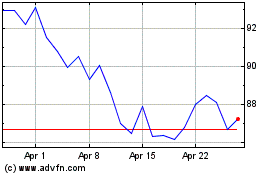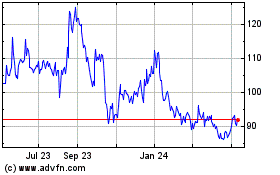By Bojan Pancevski
BERLIN -- Early last year, Ingmar Hörr was at the forefront of
the world's race to make the first Covid-19 vaccine. The company he
had founded and was leading, CureVac NV, had developed a promising
candidate using largely untested technology he pioneered.
Then, he suffered a crippling stroke that left him in a coma for
weeks. Even as he regained consciousness, he couldn't remember his
name and briefly feared he had been abducted by Russian spies.
While he recovered in the hospital under a fake identity, a
rival German biotech company, Pfizer Inc. partner BioNTech SE went
on to develop the West's first vaccine using the same mRNA
technology.
Now back on his feet, Mr. Hörr has re-entered the race. This is
the story of the blow that almost ended his life, and of how he
recovered as CureVac's vaccine effort got back on track.
Compared with many rivals, CureVac was late in submitting its
vaccine for review in Europe -- and it now expects approval there
by June. But the shot could be a godsend for Europe in particular,
which has been trailing the U.S. and the U.K. in vaccinations.
Initial data suggests it can be stored at a temperature of 4
degrees Celsius, or 39.2 degrees Fahrenheit, and could prove easier
to manufacture, distribute and administer than many competing
shots. CureVac has agreed to deliver 405 million doses to the
European Union and is working with Novartis AG, GlaxoSmithKline PLC
and Bayer AG to produce the shot. It is also cooperating with Tesla
Inc., which is developing portable RNA printers that could be
deployed to Covid-19 hot spots to quickly produce vaccines on the
ground.
All this, however, came very close to being derailed early last
year.
On March 2, 2020, then-CureVac Chief Executive Daniel
Menichella, an American, was dining at the White House alongside
other industry leaders. He held a short presentation, claiming that
CureVac could have a vaccine ready in months.
Soon after, several German newspapers reported that President
Trump had been so impressed that he tried to persuade CureVac to
relocate to the U.S. -- something the company denied. Then on March
11, CureVac announced that Mr. Menichella had been replaced as CEO
with Mr. Hörr, who had returned to the helm after a hiatus as a
nonexecutive director.
Two days later, Mr. Hörr was in Berlin when he suffered a
massive stroke in his hotel room. Luckily for him, the incident
happened when he was on the phone with his assistant, who was then
able to alert emergency services, which probably saved his life,
Mr. Hörr said.
The executive was taken to the Charité clinic in Berlin, where
doctors registered him under an assumed name to protect him from
the media attention that was surrounding the company at the
time.
When Mr. Hörr woke up from a coma in Charité's intensive-care
unit weeks later, the name on his bed was Paul Kern, and he was
surrounded by nurses who spoke Russian with each other.
The nurses were among the many Germans of Russian descent who
work in the city's healthcare system. But in his confusion, Mr.
Hörr thought he had been abducted by Russian secret services.
"It was quite the horror: I didn't know what was happening to
me, I didn't know what I was doing in this bed tied to a drip and a
catheter," Mr. Hörr said in an interview. "I understood that I had
some importance because all these people were tending to me."
After waking up, he said, he was unable to speak or move. He
spent five weeks in the emergency ward, slowly regaining his memory
and relearning basic physical functions. Once released, he would
spend another four months in rehabilitation clinics.
During Mr. Hörr's convalescence, Franz-Werner Haas, a lawyer and
CureVac's former chief operating officer, took over as CEO. Shortly
after, the German government announced that it would inject EUR530
million, equivalent to $632.5 million, into the company -- EUR300
million in equity and the rest in grants -- topped up with some
EUR80 million in EU loans. On Aug. 14, the company raised $213
million in an initial public offering to boost the development of
its Covid-19 vaccine.
It wasn't until December that Mr. Hörr became able to reclaim a
more active role in public life. By then, however, CureVac had
accumulated serious delays in its vaccine development.
Mr. Hörr had researched messenger RNA, the approach taken by
CureVac and several others for their Covid-19 shots, while pursuing
his doctorate in biology and immunology in the 1990s. In 1999,
using an mRNA molecule as a control substance in an experiment, he
discovered that it triggered a strong immune response. This led him
to set up his company in 2000 as one of the first in the field.
Mr. Hörr says the fact that CureVac was overtaken by younger
rivals BioNTech and Moderna Inc. was partly due to the nature of
its product: While both BioNTech and Moderna use an artificial
component in their mRNA to improve stability and lower adverse
reactions, CureVac has stuck to Mr. Hörr's original formula of
using only natural mRNA -- a more complex approach that has
prolonged the vaccine's development.
This, Mr. Hörr said, will enable the vaccines to be stored at
normal temperatures, unlike rival products that must be kept at
around minus-20 degrees Celsius. In addition, CureVac's vaccine
uses 60% less mRNA than BioNTech's, and one-eighth as much as
Moderna's, a potential advantage in scaling up production, he
said.
Stability at higher temperatures was a requirement in part
because investors such as the Bill & Melinda Gates Foundation
had made it an early condition of their backing, as they wanted to
provide drugs to poor nations that could struggle with complex
cold-chain requirements, Mr. Hörr said.
Now almost entirely recovered, Mr. Hörr is considering a
possible return to the company, not as a CEO, but possibly in the
management board, he said.
His next goals after bringing the vaccine to market in the EU
include developing a second-generation shot to tackle emerging
mutations and supplying the vast swaths of the developing world
where the virus is spreading unhindered, undergoing mutations that
could potentially render current vaccines less effective.
"If we only focus on the Western countries, we will allow the
virus to mutate elsewhere -- and then come back to haunt us. That's
already happening," Mr. Hörr said. "We must see this as a global
task, and the CureVac vaccine is ideal for that."
Write to Bojan Pancevski at bojan.pancevski@wsj.com
(END) Dow Jones Newswires
March 24, 2021 07:17 ET (11:17 GMT)
Copyright (c) 2021 Dow Jones & Company, Inc.
BioNTech (NASDAQ:BNTX)
Historical Stock Chart
From Mar 2024 to Apr 2024

BioNTech (NASDAQ:BNTX)
Historical Stock Chart
From Apr 2023 to Apr 2024
